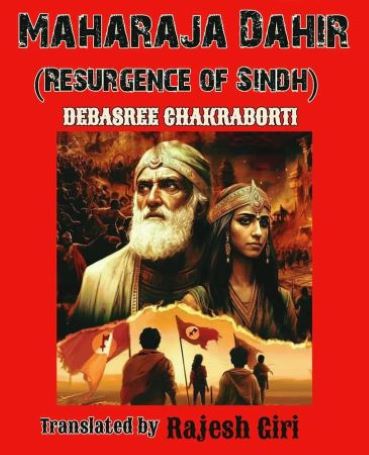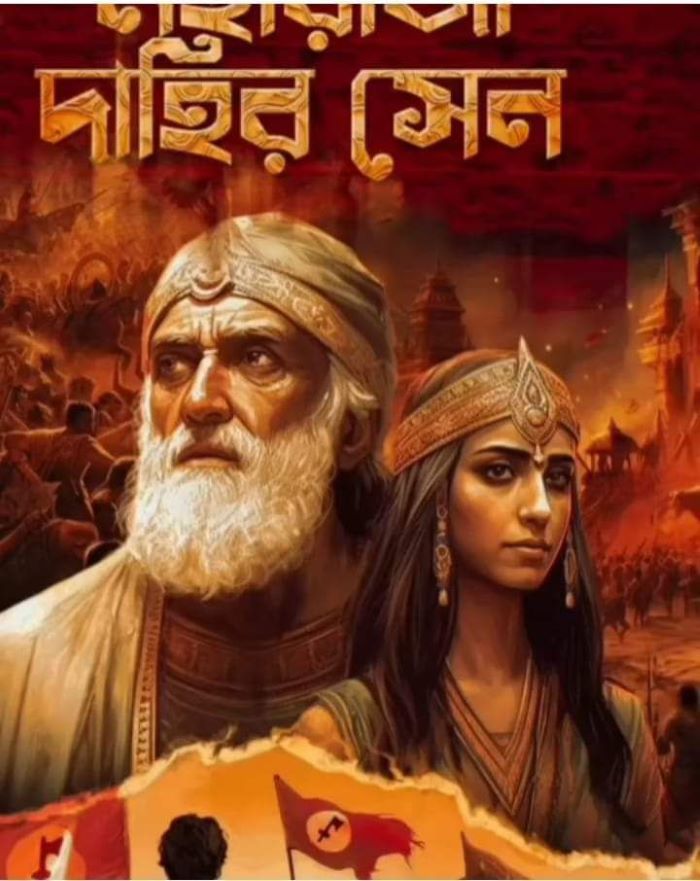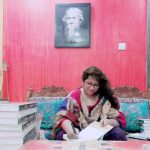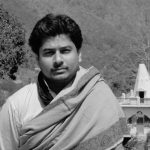
The English translation of a novel ‘Maharaja Dahir’ authored by Kolkata-based renowned novelist Debasree Chakraborti in Bengali language. The novel has been translated by Rajesh Giri
Place – Debal
Year 712 AD
On the western side of Aror where the river Indus flows, an ancient fort bears witness standing by the side of it to the great manifestation of the time with its dilapidated existence. Maharaja Dahir stands on top of this fort looking west, Prime Minister Budhimaan is standing by the side of him. The pennon of the Sindh is striding forward along the banks of the Sindhu River, blowing dust amidst the yellow mountains and abrasive nature around. The flags fluttering in the wind seemed like the flames of blazing fire, as if the west of the Indus were flaring, which was slowly rushing to swallow the whole country of Sindhu. The Prime Minister Budhimaan took a sigh and said, “Your Majesty, take shelter with your family in Hindustan while you have time, your defeat signifies the downfall of the entire Sindh.”
Sindh country is my family, my people are my children. This vast land is my mother- Maharaja Dahir
Maharaj Dahir let out a sigh and said, “I really don’t understand how you say this, Budhimaan! Knowing me for so long it seems I am so ungrateful?”
—Sindh country is my family, my people are my children. This vast land is my mother.
—A father who leaves his children and mother in the face of the enemy and flees, such sinner gets no place even in the hell. I will fight till my last breath to protect this land.
Now he raised his finger and pointed towards the west and said, Look, my son Jaisingh and his army look like a burning fireball, they are advancing towards Debal, I firmly believe that the Arab army will be burnt to the end by the impact of this fireball.
At that time the beating sounds of the bells from the north started coming out from the cave temple of Kalikadevi.
Maharaja and his Prime Minister folding their hands bowed to the Kali Maa. Maharaja prayed, “Mother I have surrendered all my thoughts at your feet, now all your wishes.”
 The sounds of bells of the Kali temple at Aror rushed in the desert of Narul to the west where Bajal commander of Hajjaj was advancing with his great army towards Debal. Deval’s troops were already disguised in different parts of the desert, they knew the strategy of attack by Arab soldiers, so in this war, they applied the strategy of the Arabs. As the lines of the Arab army swelled in the far desert, the dust blew and the horses’ hooves beat out like war drums, at that moment the rain of tridents began to shower from the other side of the battlefield.
The sounds of bells of the Kali temple at Aror rushed in the desert of Narul to the west where Bajal commander of Hajjaj was advancing with his great army towards Debal. Deval’s troops were already disguised in different parts of the desert, they knew the strategy of attack by Arab soldiers, so in this war, they applied the strategy of the Arabs. As the lines of the Arab army swelled in the far desert, the dust blew and the horses’ hooves beat out like war drums, at that moment the rain of tridents began to shower from the other side of the battlefield.
Thousands of tridents rushed towards the Arab army. Within moments, the Arab fighters in the front lines began to lose ground.
Just then Jayasingha and his army along with Debal’s brave warriors marched forward chanting Har Har Mahadev. When Har Har Mahadev sounded from one side, then Allah Hu Akbar sounded like a snarl from the other. The Arabs reappeared and informed that they could not be finished off so easily. When the two sides met right in the middle of the battlefield, it seemed as if sea storms and desert storms were showing their strength against each other.
The battle between the two sides started. Jaisingh rode into the battlefield on a huge elephant. The horses of the Arab soldiers, who had never seen an elephant, dismounted at first when they saw this huge animal and heard its roar.
When the Arab horses were scattered, the army also became disoriented. The most important piece of the Arab army is the Arab horses. In such a situation, Commander Bajal, seeing no other option, took off his turban and blindfolded his horse.
A father who leaves his children and mother in the face of the enemy and flees, such sinner gets no place even in the hell. I will fight till my last breath to protect this land – Maharaja Dahir
On that day, Shivatandava resounded in the battlefield. Every Sindhu army, as if transformed themselves in the form of the mighty Mahadev, rushed upon the Arabs. The battleground tainted red with the bloodshed of hundreds of thousands of warriors on both sides. The people of Debal fought valiantly under the leadership of Jaisingh to protect the honour of their motherland, when the sun was setting on one side of that battlefield. At the end of the evening when the last sun was covering the entire desert with the shadow of his black cloak, the nature became cheerful with the tired returning birds from the far beach. At that moment the last beam of the sun suddenly blazed with the Sword of Jaisingh. When the scavenging vultures begin to surround the battlefield smelling the dead, Bajal was killed by Jaisingh. The mighty blow of Jaisingh’s sword separated Bajal’s head from his body and threw it distance away. The few who were alive among the thousands of Arab soldiers their condition was worse than the dead. The soldiers of Sindh surrounded them from all sides with tridents in their hands and cheered their victory. Among the Sindh army, the Arab soldiers were helpless, frightened and begged for their lives. The exultant Sindhi soldiers took away all their weapons, but were released on Jaisingh’s orders. As the freed surviving Arab soldiers rushed towards the borders of Makran, a messenger with the news of victory left the battlefield on horseback and headed for Aror via Debal.
On that day, Debal city was decorated with yellow flowers and lamps. After the news of victory came, worship started in the magnificent temple of Shiva situated at the middle of the city. Citizens were waiting by the roadside with flowers. When Jayasingha and the conquering warriors of Sindh entered the city, the nagaras rang out from different parts of the city, the Brahmins standing on the platform of the Shiva temple blew conch shells, chanting of hymns and puja started in the sanctum sanctorum of the temple. Citizens welcome the winners by showering flowers and chanting Har Har Mahadev.
That evening, Maheshwar Banik’s palace on the sea shore of Deval was also decorated like a bride with yellow flowers and lamps.
The palace looked like a shining golden luminaire on the beach. Nahvat was placed on the entrance of the palace. The sea breeze accompanied by the sound of Shahnai carried the message of Debal’s victory to the passengers of the distant ships. Jaisingh and his entourage marched the path in cadence decorated with flower garlands and torch lights, the lights are as if dancing in the sea breeze to welcome them. Seeing Jaisingh coming, Maheshwar Banik, the merchant and his two sons Hara and Bhava came forward with folded hands. At this time Maheshwar’s wife was waiting at the door of the palace along with other merchant housewives with a barandala (a wicker-tray holding articles with which one is received ceremonially). They welcomed Jaisingh and accompanied him inside the palace. (Continues)
Click here for Part-I , Part-II, Part-III , Part-IV , Part-V , Part-VI , Part-VII, Part-VIII , Part-IX , Part-X, Part-XI, Part-XII, Part-XIII , Part-XIV
_______________
 Debasree Chakraborti is a renowned novel writer of Bengali language. Based in Kolkata, West Bengal, India, she has done Master’s in Modern History from the Kolkata University, and authored some thirty books, mostly the novels, with historical perspective and themes. Her most recent novel is ‘Maharaja Dahir’ that covers the history of Sindh from 662, the year of first attack on Sindh by the Arab armies till date.
Debasree Chakraborti is a renowned novel writer of Bengali language. Based in Kolkata, West Bengal, India, she has done Master’s in Modern History from the Kolkata University, and authored some thirty books, mostly the novels, with historical perspective and themes. Her most recent novel is ‘Maharaja Dahir’ that covers the history of Sindh from 662, the year of first attack on Sindh by the Arab armies till date.
 Rajesh Giri, born in Kolkata, had his early schooling from Kolkata and then from Medinipur—a village in Bengal. He graduated from Calcutta University with Physics and Maths and Master’s from Burdwan University in 2016. Now he is associated with Adhdhyaan educational institution teaching Physics. History enthusiastic Rajesh Giri is particularly interested in the ancient civilization of India and other regions like Egypt, Mesopotamia, and North America. He loves traveling.
Rajesh Giri, born in Kolkata, had his early schooling from Kolkata and then from Medinipur—a village in Bengal. He graduated from Calcutta University with Physics and Maths and Master’s from Burdwan University in 2016. Now he is associated with Adhdhyaan educational institution teaching Physics. History enthusiastic Rajesh Giri is particularly interested in the ancient civilization of India and other regions like Egypt, Mesopotamia, and North America. He loves traveling.